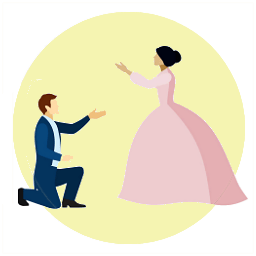The musically spoken dialogue or Recitative is a type of vocal music representing conversation. Like opera, the actors sing their parts yet differ from opera in that the actors in recitatives speak in a musical manner of tones; each syllable is a separate note. In arias or chorals, the actors play the parts in the style of the opera or oratorio while the recitative carries over and advances the plot. The earliest recitative is also the earliest surviving opera, 'L' Eurodice' composed by Italian Jacobi Peri in 1600.
The recitatives melodies are quite simple often imitating or exaggerating the vocal parts. The first original recitatives would be accompanied by harpsichord or basso continuo yet in Italian opera seria (serious opera), the composer kept the other instruments steadily involved in the character of the recitative voices. This practice seems to continue into the 19th century Romantic Period.
It would soon be difficult to determine between the recitatives and the arias of the time. By the time Mozart and Wagner completed their latter works, the recitative differences would be unnoticeable. The audience felt that a fast paced recitative with equally stepped action on stage added to the enjoyment and entertainment quality of the performance, especially favorites like Mozart's 'Marriage of Figaro' and Rossini's 'Barber of Seville.'
Late Renaissance Recitative
'L' Eurodice'
Composed by Jacobi Peri 1600
Romantic Recitative
'Barber of Seville' Act 1
Composed by Gioachino Rossini 1816
1600
1641
1724
1742
1786
1786
1787
1816
1871
Wolfgang Amadeus Mozart


